Otaku confession: I was a Satoshi Kon Imposter.
No, not a Satoshi Kon impersonator, though I’m curious about what that would look like and what strange circumstances would demand such an impersonation. Acclaimed as director Satoshi Kon is, both in Japan and abroad, like many anime industry superstars, his fame remains somewhat niche.
For years, I have recommended Satoshi Kon movies to friends. I have written articles about his brilliance and referenced Paprika in pieces about surrealism and mental health. I have bonded with more than one friend (sorry, Jenn!) while discussing our mutual admiration for his artistry. When Satoshi Kon died in 2010, I was shocked and saddened, knowing what a loss he would be to the world’s cinematic landscape. I’ve referenced Millenium Actress on panels at comic conventions and suggested friends add Tokyo Godfathers to Christmas movie playlists. I have often thought that Apple TV’s Severance, in its best moments, is reminiscent of the Satoshi Kon canon.
I have immense respect for Satoshi Kon and his work with Madhouse, a studio that still maintains a reputation for producing cutting-edge animation (Frieren, anyone?). Kon was a true auteur, a visionary whose directorial eye helped elevate anime into a medium that could broach psychological issues from a unique perspective.
So here is what I mean, when I say that I have been, for the entire of my weeb life, a Satoshi Kon imposter:
As of March 8th 2025, I had never, ever watched a Satoshi Kon film. Not one, not once.
I did watch a few episodes of Paranoia Agent back in college. It was compelling and disturbing and a little hard to parse. I started it, but did not finish it.
I am aware that this bizarre level of deception, however odd, more or less disqualifies me from writing about cerebral anime with any expertise. So now that I have come clean, let’s remedy this whole imposter debacle. Let’s start at the beginning by watching what is considered Satoshi Kon’s directorial debut: 1997’s Perfect Blue.
Experiencing Perfect Blue (1997)
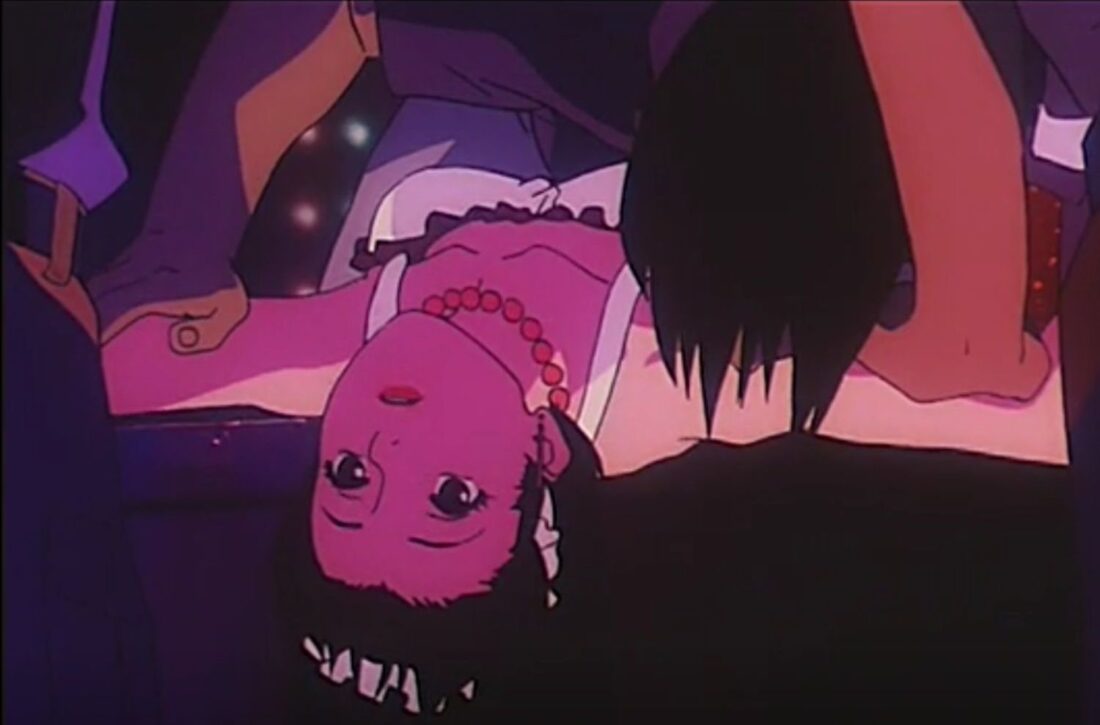
In life, we all have to make career choices that could backfire spectacularly. I have never seen a film dramatize that concept so explosively as this one, and Satoshi’s Kon’s deft ability to capture mental illness through an animator’s lens is worth every bit of the hype he’s received. It’s in movies like this that animation is key. Live-action can never quite convey a shift in reality so well as an artist with a pen. Waltz with Bashir, with its horrifying ingenious breaking of the lens, comes to mind. We have to trust animators to tell us a story honestly, but when they create every aspect of the world on screen by hand, any part of it can be deceptive.
When Mima, a beloved pop idol, decides to retire from music and become an actress instead, she is stalked mercilessly by a fan of her previous work. Mima is disturbed to find herself being impersonated online, with diary entries she never wrote being shared with the public. Mima’s public persona as an idol was defined by youthful purity, but her decision to end her career early and take part in a film that requires her to perform in a traumatizing rape scene shatters that notion for delusional former fans. They surround themselves with images of her, fantasizing about who and what she is.
All this before parasocial relationships were part of the common parlance. As is fitting from a man with Kon’s reputation, Perfect Blue does feel ahead of its time. The film was made before catfishing had a name, before Tegan and Sara spent years dealing with a stalker, before reports of people stalking Taylor Swift and Harry Styles became part of the news cycle. The ’90s are weirdly romanticized by folks in my generation, but beyond the Furbies and Beanie Babies, the ’90s truly did give the world some of the best science fiction films, anime and otherwise, of all time.
Perfect Blue, while not science fiction, is just as good at bending the brain. The film delves deep into the terror of being perceived, as if to be seen for what we really are is to be exposed to a blade. Thirty years after Perfect Blue first wowed audiences at film festivals, that remains true. The vitriol that those in the public eye experience when they dare defy the expectations of strangers is no less vicious today than it was in the past.
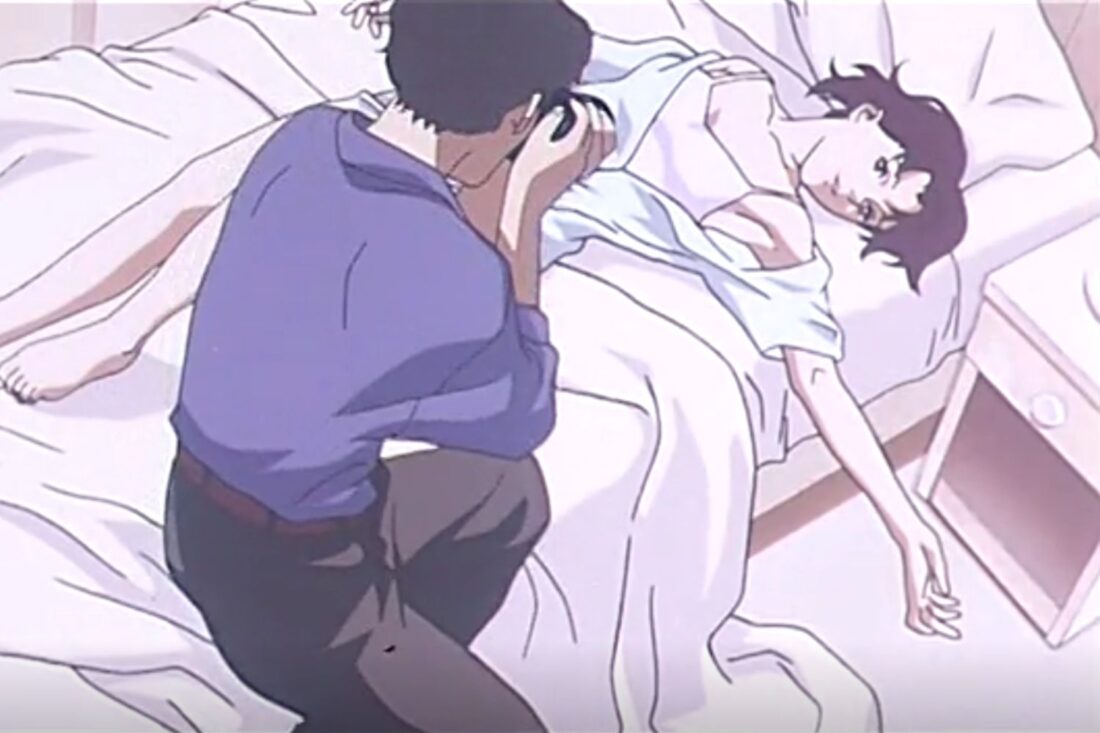
This sort of horrific exposure and backlash is most commonly heaped upon young women in the public eye. Entertainers who transition from childhood to adulthood in the spotlight are criticized to the point of absurdity. I remember too well the amount of controversy Miley Cyrus incited when she threw out her Hannah Montana wig and mounted construction equipment in her underwear. The 2014 leakage of celebrity nudes via iCloud reminded women just how little their privacy is valued or taken seriously. More recently, the disturbing discourse around Millie Bobby Brown’s coming of age has given the wider public the ick.
As women we are often told, both directly and indirectly, that we are not using our bodies correctly. I don’t know any woman, cis or otherwise, who has not been confronted with this harsh truth. The bigotry is sometimes so deeply ingrained as to be hilarious, such as when my painfully awkward cousin from a tiny Baptist private school shook his head at my dyed pink bob and said, “Women should always be natural.” I laughed in his face. Had I been more savage, I would have told him to go back to writing his Star Wars prequel fanfic. Not because I dislike fanfic, but because my cousin sharing his good Christian opinion of what a woman should be while escaping into a Jedi fantasy rather than, say, actually speaking to women who were not cousins was very funny to me.
Similarly, the global idol industry has often been under fire for creating false public personas. Aspiring J-pop and K-pop stars know very well that success can only come with a contract that stipulates they will not date, lest they destroy the fantasies of some fan or another and ruin their public image. To be a pop idol, one must seem attainable to every glowstick-wielding devotee but in truth remain unattainable to anyone. As we have seen all too often, these impossible standards have led to destructive mental health issues. The number of suicides associated with the Korean entertainment industry is frankly harrowing, and it shows no signs of relenting.
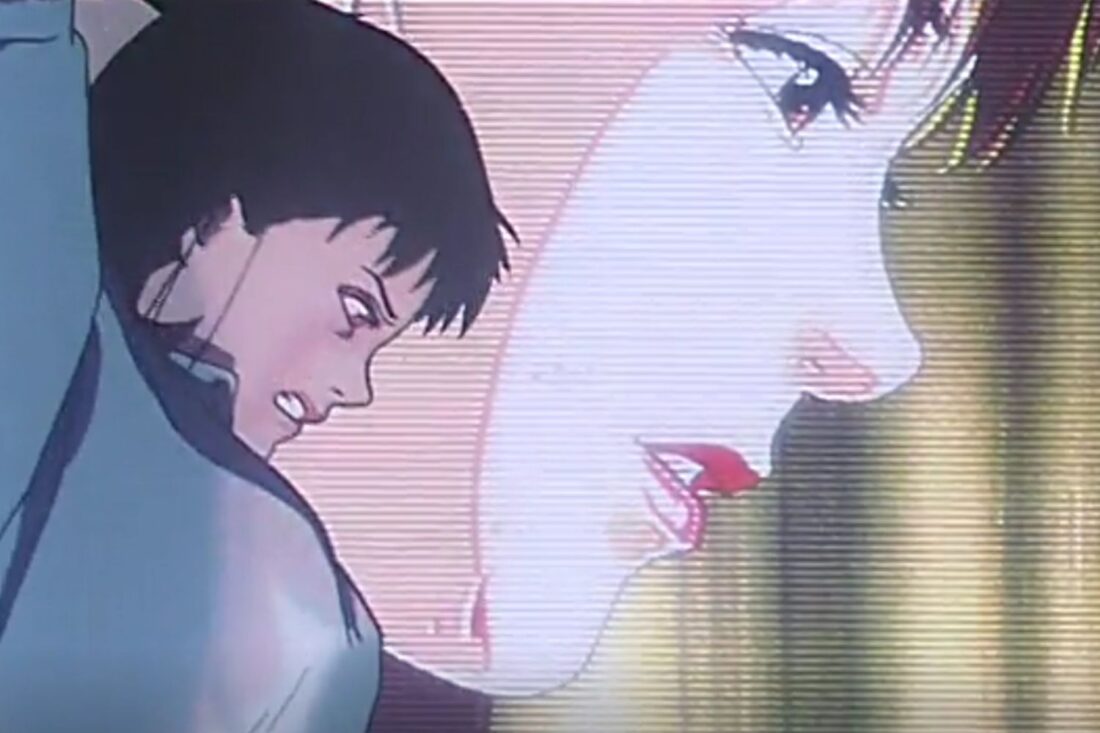
Satoshi Kon adapted the novel that became Perfect Blue decades before the Burning Sun scandal, but notably after the murder of Selena by her obsessive manager, and after Björk’s stalker sent a mailbomb to her house in London and then took his own life on video. Celebrity, especially celebrity for women, has always been a loaded gift, a package that, when rattled, detonates and explodes all too often.
In the film, Mima, facing all these pressures, begins to crumble, dissociating and bringing the audience along with her for the ride. We are not always certain what is real. What is fact and what is fiction becomes increasingly harder to discern as her distress deepens. Did Mima really kill her photographer after he coaxed her to film nudes with him, or did she only fantasize about killing him? Could she be responsible for multiple murders cropping up in her vicinity? Is the other Mima who begins tormenting her a real person or another figment of her shattered, regretful mind?
Well, I won’t spoil the movie.
You really should watch it.
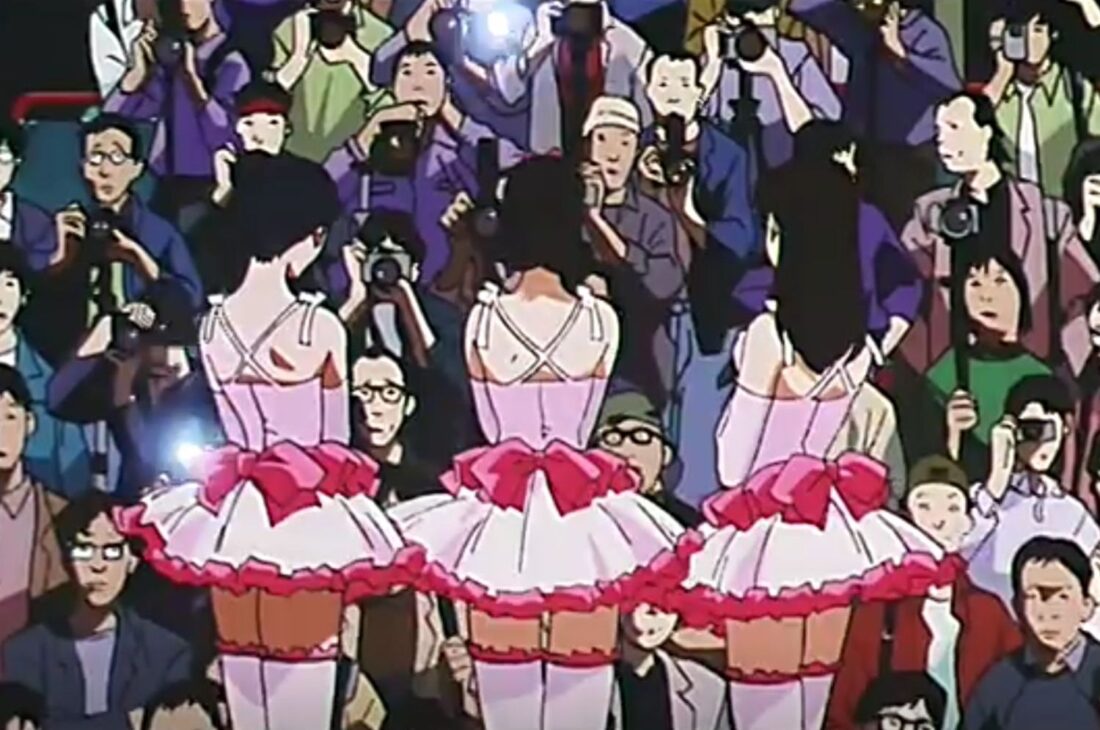
Suffice it to say Perfect Blue is deserving of all the accolades, and established Satoshi Kon as a master of psychological thrillers. While some have accused this first effort of foregrounding style over substance, that seems disingenuous. After all, the point of the movie is that it is impossible to trust our perception. The world we see is always stylized, and interpreted by the eyes through which it is seen. And what if those eyes are offering faulty information? As a society, at some point, we all moved into the uncanny valley and got too comfortable. However heavy-handed, Perfect Blue’s chilling message stands strong.
The world is a deceptive place, forever tainted by the psychological limitations of its observers, and any piece of art that thoughtfully addresses the unease of this reality is bold and necessary.
So… have you watched it yet? (If not, why haven’t you watched it yet?)
A Second Confession
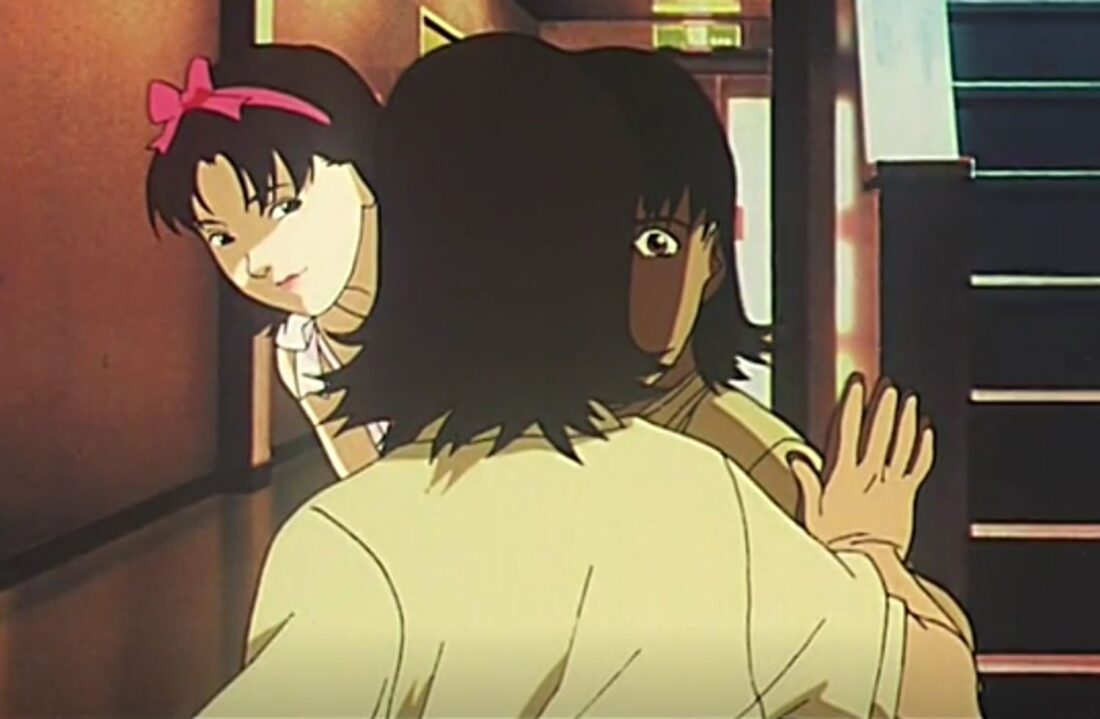
Confession: As of the publication of this essay in March of 2025, I still haven’t watched any Satoshi Kon movies. That review of Perfect Blue was all bullshit, compiled solely from what I gleaned from perusing the movie’s thorough Wikipedia page and skimming the movie to harvest screenshots.
Did I fool you, or was it obvious? And how do you feel about it?
Because, okay: I promise I am not doing this to be an asshole. Instead, I am using this experiment as a springboard to discuss a particular experience that has been bothering me and, I suspect, countless other people for at least a decade now. And that’s this: when was the last time you enjoyed something based solely on your perception of it? When was the last time you got lost in a story by pure, beautiful chance?
In a world where Google’s crappy AI suggestions are relentless and social media is never-ending and videos discussing media gain more views than the source content itself, it is almost impossible to escape the opinions of outsiders. Not to go full dystopia on everyone, but very few people worldwide, and certainly not the people reading this, exist in a vacuum. When did you last start reading a book without influence, be it word-of-mouth or recommendation or reading a review? When did you last walk blindly into a movie without having seen a prequel or a trailer or noting a positive Metascore?
For years now, I have deeply missed the joy of enjoying something by accident, without context.
When I was a little kid, I relished walking into a library and picking a book from the shelves with zero context and, yes, based on the cover. It was exhilarating, the power of that choice, the lack of pressure or sense of obligation. I read the entire Animorphs series not because anyone recommended it to me, but because those batshit covers were irresistible to a 7-year-old cat-obsessed weirdo. I stumbled across Diana Wynne Jones because I wanted a big book to read during reading month and the spine of Dark Lord of Derkholm was delightfully thick.
As an adult, I have tried more than once to recreate this experience. As an author, even one whose head is doggedly buried in the sand these days, it proves a nearly futile exercise. It is impossible to choose a book without reading a blurb, or to pick a book from a table at a bookstore that has not already categorized it as a #Booktok Banger or whatever. I miss the immediate immersion and dissociation a book could provide when it seemed to exist only in your mind and hands. That was true escapism.
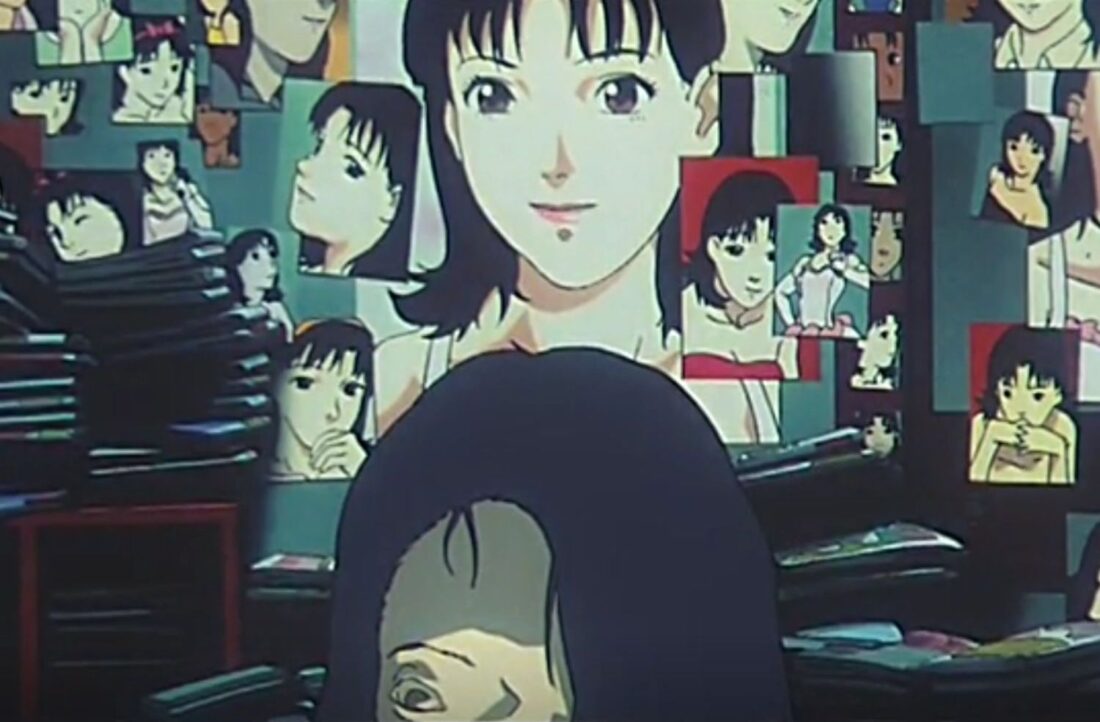
When I think back to my unmedicated early college days, hating dorm life but using anime to cope, I was constantly seeking similar experiences and failing to find them. At the time, people who wanted to enjoy alternative music or hidden gems were called “hipsters,” but in my mind, the phenomenon itself was less about seeming cool and more about feeling like an individual. During the 2007-2008 writer’s strike, I became obsessed with shows long since canceled, such as HBO’s Carnivale and of course, Firefly. But the internet had already seeped into us all.
Are there ways today to enjoy something by ourselves, without outside interference? Well, maybe, if you really try. You can look at a list of pilots on TV and watch one at random based on its name alone. You can walk into a bookstore and ignore the recommendation tables and pull a book from the shelf without looking at it. You can spin a roulette wheel of anime, or find a movie you haven’t heard about before while ignoring all online discourse.
There’s a reason millennials pine for the days of MySpace and StumbleUpon. It’s aligned with the reasons why a more chaotic algorithm appeals to a restless mind and the reasons why nostalgia-infused franchises refuse to die. We long for novelty in a world that is very, very tired. And it is harder and harder to find, so we rely on the easiest ways to mimic the feeling.
I am, all too often, guilty of parroting the opinions of those around me, especially those I respect. In university, I was so insecure about enjoying anime that I felt the need to justify it by watching “highbrow” anime, whatever the fuck that meant. But you know what? I did not enjoy Serial Experiments Lain half as much as Blue Exorcist. Serial Experiments Lain is a classic and arguably a masterpiece, but damn it, I liked my mediocre shōnen action series about demons and angsty brothers way, way better.
I am so tired of pretending otherwise. So while we’re at it, I will come clean: I have never read War and Peace or A Farewell to Arms and I think A Thousand Years of Solitude is pretty gross. I claim to be a die-hard science fiction and fantasy stan, but I will probably never read The Martian even though I liked being on a panel with Andy Weir, who seemed like a really nice guy. I have disliked every Tarantino movie I’ve ever been subjected to, and do not understand why people like the Coen brothers so much. I have not read the Parable of the Sower, and I had to google what a parable was because I thought it was the same thing as a fable. I have so far stubbornly managed to avoid listening to any of Brat, even though I’m a queer bitch who adored Charli XCX’s debut album. My favorite science fiction movie is, easily, The Fifth Element.
I have an English degree and five published novels under my belt, but once, in front of a class of seventh graders, I pronounced hors d’oeuvres as “Whores Dee Oovers.”
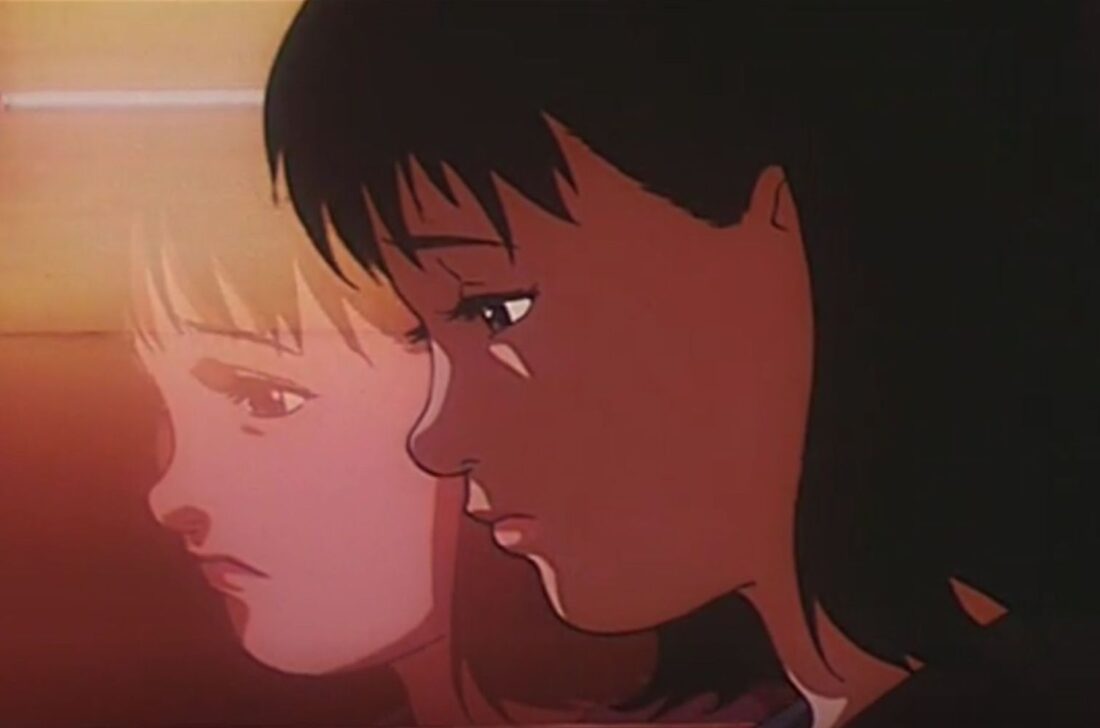
I am an imposter on countless fronts. Why is that, and how many of you are the same? Of course, some of us just like being oppositional, like my very trying student who, when I say “On the count of three, please sit down,” will always sit down one second late and stare me in the eye. We’ve all been recommended things we are assured we will love, only to put off enjoying those things indefinitely because that expectation alone is too much pressure. Because what if the recommendation is way off and you hate the thing, and you have to question how the person who recommended it sees you?
It’s like when someone buys you the world’s most hideous pink t-shirt with embroidered flowers on it and shoulder pads (why would a t-shirt ever have shoulder pads?!) and says, “It reminded me of you” so you smile and take it and say “Wow…yeah” until your sister tells you it’s hideous and you are finally able to blurt out a grateful agreement and throw that thing away. (I mean, that’s just a completely fictional example…)
But is it worse when you do love the thing that’s recommended to you? Odds are I will love Satoshi Kon movies if ever I watch them. But do I want to be so easily sussed?
When I was young and wanted to feel important, I thought I needed to be un-sussable. If I was the only person in the building obsessed with The National and submitting terrible stories to Asimov’s, I was a valuable person by virtue of being different. Taking recommendations felt like admitting defeat.
But even in the case of anime, something I recommended to myself, researched myself, and watched in secret in the wee hours of the night, I felt the same way. I recommended Satoshi Kon to myself a few times. But then could not commit. Because what if I was also wrong about what myself would like? Man, what a mindfuck that would be. (Can you tell I have an anxiety disorder?)
I suspect we are all imposters at times, and our pride keeps us posturing long after the need to do so dissipates. I find it all exhausting, and sometimes I want nothing to do with content people tell me is meaningful. Whether because my emotional bandwidth is spent, or because I am saving those gems for the rainy day when I need them, I don’t know. I prefer to think the latter, but there’s no denying that I feel like Mima sometimes, watched by the world but unseen by it simultaneously. (Why does the algorithm think I want fluffy clogs? Do I seem like a fluffy-cloggy person? Who could wear those in the rain?)
Having said all of this nonsense about the terror of being perceived, there is no time like the present to appreciate the surreal genius of Satoshi Kon. I really will go watch Perfect Blue now.
Or maybe I won’t. Or maybe I’ve already watched it.
You’ll never know, and you really shouldn’t care.










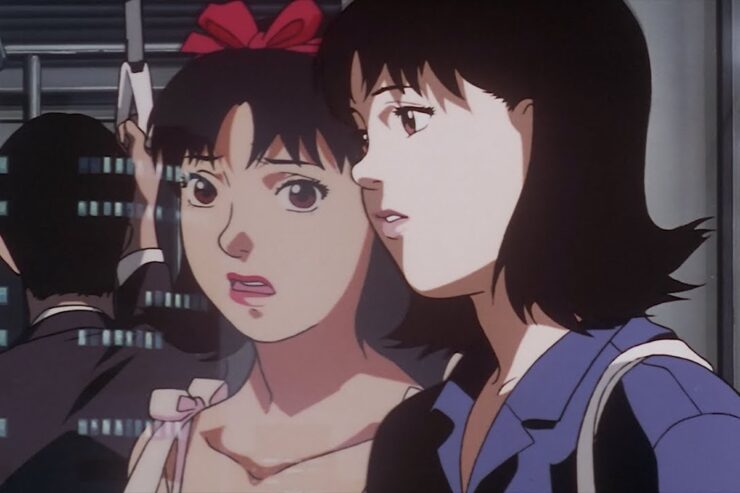
I have watched all four of the films you mentioned but it was many years ago. Perfect Blue is the one I remember the best, so I guess that must have been my favorite. The Fifth Element is your favorite SF movie. Copy that.
I can’t say that I am immune to the influence of the web, but there are still some things that I still choose purely by instinct, like Japanese novels and Kdrama. All I read is the summary and if it speaks to me I dive right in. Sometimes, but not very often, I abandon the latter without watching them to end, but somehow the books never seem to disappoint.
I have watched none of Severance and I’m not sure I ever will because everyone seems to be watching it. Go figure.
I can relate somewhat to the Japanese novel experience being gratifying. Living in Japan, bookstores that carry English books usually carry a lot of translated books by Japanese authors. Picking up one of those without context has often led to a great read. For instance, I am just about finished with Mieko Kawakami’s Heaven and it is harrowing but excellent. And I definitely have friends who have dived deep into Kdrama and Thai BL and more and found treasures there. I think maybe we have to work a little harder to find something new, but it’s still achievable if we really want to!
Several years ago, Justin Sevakis recounted his experience regarding the world premiere of Tokyo Godfathers at Big Apple Anime Fest with Satoshi Kon himself in attendance. It wound up becoming an epic Charlie Foxtrot that normally only occurs in sitcoms.
https://www.animenewsnetwork.com/tales-of-the-industry/2015-02-24/.84253
That’s okay, don’t think you’ve missed much by not reading “The Martian”! Decent entertaining read, once you make it past the McGuffin it starts with – but there are many more SF books out there that are so much better. But I can see why it was soon made into a Hollywood movie, and much better books weren’t.
So many great books are great because they can only be books.
Not to sound like the SFF old guard, but there really are some books that seem impossible to adapt into live-action movies or tv. Sometimes, though, that’s where I think more creators who want adaptations should consider animation.
I watched Perfect Blue in, I think, 1998, and really disliked it. I found the main character irritating, I felt the resolution was clichéd, and I think if this wasn’t an -admittedly beautiful – anime but live action, it wouldn’t be seen as a masterpiece, but as a middling thriller. I don’t know if my opinion would differ today, but I don’t have any interest in watching it again.
I don’t think Perfect Blue is supposed to depict likable people or a comfortable story. And I think the artistry is the main draw, because rarely has animation been used to create suspense and thriller films, at least when it comes to Western animation. Satoshi Kon’s appeal is, IMO, toeing the uncanny valley and depicting realistic terrors in a surreal way. In that case, I think he does excel.
But heck, this whole article is about liking what you want to like and not being obligated to feel differently, so I hear you.
As it happens, I bought a copy of Perfect Blue on DVD, not really knowing anything about it or about Satoshi Kon, because it looked kind of interesting. (It was; I did not regret my impulse buy.) That’s not something I do very often anymore. Even with on-demand access to multiple platforms, I rarely just watch something without knowing at least something about it. And that knowledge always comes from somewhere, formed from other people’s tastes and opinions. I do really miss the serendipity of channel surfing into something cool and unexpected. So, I get that.
I also sometimes find myself withholding judgment on things that I do watch until I see how others are talking about them. Or at least I let my opinions be influenced by fan and critical commentary (including here) a lot more than I once did. So I get that too. The flip side of that is that exposing myself to other people’s opinions and criticisms has often been beneficial to me. So has being open to suggestions for things I might not have tried otherwise.
But life is short and nobody has time to do everything. We all have to make choices. There are things I’d probably enjoy that I’ve never picked up. There are things I tell myself I ought to try but I, for whatever reason (and there are many – some more rational than others), when I look at my watch list, or my TBR pile, I don’t want them. Or at least not then. Maybe I’m missing out, but I have enough regrets. The option to go back for it hasn’t gone away.
I don’t think it matters why we choose what we do, except in the general sense of trying to understand who we are and how we work. I think Perfect Blue deserves its reputation. But that doesn’t mean anybody should watch it, in the sense of it being some kind of failure if they don’t.
And I also don’t think the way to satisfy a craving for serendipity is to try exclude any outside influences. I don’t think that is what you’re suggesting, anyway. There’s room for both positive and negative choices, including the choice to act on a whim, the choice to finally pick up that thing one has been avoiding for a while, or the choice to shelter within one’s comfort zone. The same person can do all of these things at different times and nobody gets any prizes for which choices they make.
Yeah, all points I agree with, and excellently put. More than anything, I think it’s interesting to reflect on why we make the choices we make, now that we have the ability to choose almost anything. And why, now that basically all the entertainment in the world is accessible to us, we so often choose to reread favorites or rewatch classics or watch nothing at all rather than become invested in something new. I used to think it was a comfort thing, but more than that, it’s like I don’t even have the bandwidth, sometimes, for either disappointment or discoving a new favorite. We are all so overstimulated.
I love a good recommendation, and I definitely don’t want to watch terrible things at random when life and time is short. (Except in the grab bag articles, which prove that random selections can be a lot of fun in doses).
I had that feeling of ‘blind discovery’ recently. A local bookstore I used to volunteer at was going out of business and having a sale, so I perused one last time and stumbled on a used paperback set of “The Liveship Traders” by Robin Hobb. It caught my eye because I had read that title before on a list of books similar to the Merchanter series by CJ Cherryh, which I loved. I hadn’t really been interested in them at a glance because it was Fantasy, and the blurb didn’t particularly grab me. But being that this would be my last time in this store, and the fact it was a complete set, I decided to take a chance. Even then it took me several months before I opened them up. They proceeded to become some of my all-time favorite books. And part of the joy of that discovery was the fact that I had no preconceptions of what they’d be about or what to expect—so when it turned out they contained most of what I look for in fiction, it truly felt like coming upon a hidden treasure. Robin Hobb may be a familiar name in SSF circles, but she certainly isn’t a renowned author in the likes of Tolkien or Martin. I actually felt kinda mad that nobody had recommended them to me before, because I could have been loving them for longer had I known they existed! But I shouldn’t complain too much, because it just meant I could look forward to reading the rest of her books.
But that experience was definitely an exception, rather than the rule. I feel you, Leah, on the frustrations of modern media consumption. I’ve been guilty of absorbing other people’s reactions to a thing before consuming it myself, and being colored by those opinions. Too often I’ve taken something up based on recommendation and have been disappointed. But the opposite has happened as well! Sometimes the hype is justified. But it does make me wonder how many other undiscovered gems are lying beneath the river of the algorithm.
What a great little story. And man, I do relate somewhat to the sense of betrayal or anger that no one told you about the books. I’ve had that experience of loving something and wondering, “why the heck hasn’t anyone told me about this?” It’s the reverse experience of getting a shitty recommendation and being told “It’s so up your alley.” Both make you wonder how other people see you, or whether people actually understand your tastes, ahaha.
There are definitely things that are worth the hype and then some, and others which are not, and an algorithm and reviews complicating things. When I published my first book, I learned very quickly that I could never read reviews because it decimated my mental health. Not just negative reviews, but even very positive ones. It was surreal to find people who seemed to love my books while failing to understand them the way I did. The dissonance was jarring, though of course, I know that’s how people relate to content. An author puts something out and then it’s not really up to them how different people interpret it. But it can be really, really, hard to deal with that foreign perspective. For me, reading reviews told me what I was writing and what kind of writer I was and then sort of pigeonholed me in my own head. I avoid Goodreads like the damn plague.
Kind of hilariously, this article, with its multiple layers of truth and reality, asking, “But is that really what happened?”, is actually very reminiscent of Perfect Blue!
(Saw it as an anime-loving teenager, nearly had an existential crisis at the time. Some time later I saw Black Swan and had a similar response, and later learned that Aronofsky most likely was inspired by Perfect Blue.)
That…may have been on purpose.
(Keith Morrison voice) Or was it?
And yeah, I’ve heard at one point Aronofsky wanted to adapt Perfect Blue, but I’m pretty glad he did not. Black Swan is a solid movie with its own flavor, but I can see the inspiration for sure!
I have a few friends who have a similar taste in music to me, so when they ask if I fancy going to a gig, I just say yes.
I never try listening to the artist beforehand, I go in completely blind (deaf?).
I trust my friends’ taste enough to know that’ll I’ll probably like the music, even if I don’t love it, and it’s fun to get a complete surprise when the artist walks on stage and starts playing.
I don’t tend to do this as much with books or films/tv, although various articles on this very site have prompted me to buy books with only a very vague idea of what I’m getting into. Most of the time that works out really well.
The question of whether a viewer in a media saturated society can come to things fresh is an interesting one. I think the answer is yes but only if it’s important enough to the individual to make it a priority.
A good analogy might be veganism. Totally doable but society isn’t set up to support that decision. You generally can’t ever go with the defaults most everyone else are following.
So for media you are skipping all the trailers. You are making a point to skim over essays, reviews, or videos that might spoil something before diving in. You judge friendships over whether they think “I won’t spoil it but wow what a twist at the end!” is itself not a spoiler. You try and avoid any platform that’s pushing a targeted stream of content at you specifically (e.g. public Youtube vs the algorithm built around a logged in user). And so on.
It’s something I try to do and I feel it’s doable. But coming into media fresh is really really important to me. So I do my best to work around that.
I also think it’s easy to get into analysis paralysis where one’s intent is to find something good to watch but it turns into a search for something perfect to watch. So that gives me some extra motivation to skip ahead to the thing itself.
Switching gears to Satoshi Kon: Millennium Actress is my current favourite of the three films I have seen (I’ve not seen Tokyo Godfathers yet). I think it’s a wonderful example of a film that accomplishes with animation what would be extremely difficult to accomplish in live action. I also feel it best executes Kon’s interest in questioning the line between fantasy and reality. All of his films are favourites of mine but that’s currently top of the heap.